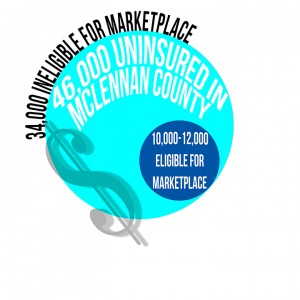
Reporter
Many in Texas have no options for health coverage despite the aims of the Affordable Care Act.
Jan Gill is finishing her third semester at McLennan Community College. Stacking books in the library a few hours every day, she collects a paycheck from her work-study.
“I’m with CHIP,” Gill said. “It covers my medical and dental.”
CHIP is Texas’ Medicaid program for minors. It covers medical expenses for children whose families don’t have a very large income.
In a few months, Gill will celebrate her 19th birthday and then she’ll decide what to do about health insurance. Since state leaders decided not to expand Medicaid, she may be strapped for options.
“The insurance I have now is only going to cover me until I’m 19,” Gill said, “My mom doesn’t have health insurance that will cover me.”
In May 2013, Texas legislators had the option to accept funds from the federal government and include more people in Medicaid coverage.
The expansion would have put childless adults, who earn less about $16,000/year under the Medicaid umbrella.
Republican Rep. John Zerwas, district 28, was in Austin the day the legislature decided against expansion.
“A lot of it was because of a political slant, more than anything,” Zerwas said.
Zerwas had an idea to make insurance policies available to many of those individuals who, today, are left with no healthcare options.
“The bill was intended to create an opportunity to give actual insurance policies to childless adults that were below the federal poverty level, under 138 percent,” Zerwas said.
The representative authored a compromise over the Medicaid expansion vote.
House Bill 3791 would have had the governor sign a waiver in Washington to procure expansion funds for the solution.
The compromise was not received well at the conservative-controlled legislature, and, in the end, never left committee.
Now, many Texans are in a precarious position.
“To qualify for Medicaid in Texas, someone needs to be elderly, or have minor children living in the home and meet the income requirements for receiving Medicaid,” said Linda Gockel, spokesperson for the Texas Health and Human Services Commission.
Those income requirements are determined in relation to what the federal government recognizes as a poverty level.
By establishing an income-based definition of poverty, individuals and households can be classified by their standing before or behind the federal poverty level.
The Census Bureau updates the federal poverty level annually. It is an income assessment of U.S. citizens who are poor.
This year, for example, the Census Bureau states that a family of four earning $23,550 per year meets 100 percent of federal poverty level.
Income eligibility for Medicaid and CHIP varies by case and determines who qualifies in relation to the poverty level.
For example, where a pregnant woman can be under nearly twice the poverty level and receive federal assistance, most non-disabled adults are out of the running at 0 percent of the poverty level.
To qualify for help purchasing a health insurance plan via the Health Insurance Marketplace, a person must earn at least 100 percent of the federal poverty level, $11,490 per year.
Ineligibility for marketplace assistance resumes at four times the poverty level.
In Texas, it is possible to earn too much for government healthcare coverage and too little to qualify for help buying it privately. There is a gap.
Dr. Roland Goertz is the CEO of the Family Health Center in Waco, a non-profit clinic system that serves the area’s uninsured population.
“Our best estimates say there’s 46,000 uninsured in McLennan County,” Goertz said. “Of those, we believe 10,000-12,000 are probably eligible for the marketplace.
That leaves about 34,000 people who will potentially be left out in the cold.”
Statewide, the Texas Health and Human Services Commission believes over 1 million citizens fall in the gap.
Individuals who have no healthcare options because of the state deciding not to expand Medicaid will not face the penalty for being without insurance after March 31.
On this date, citizens not covered by federal assistance or a health insurance plan will face a penalty through the Affordable Care Act.
Since state leaders opted not to expand Medicaid, many childless adults, jobless and working parents who live on means under the poverty level have no help affording health insurance, Goertz said.
Texas is only one of 25 states that also decided against expanding their Medicaid programs.
According to the Center on Budget and Policy Priorities, of all the people who fall in the gap nationwide, a fifth of them are in Texas.



